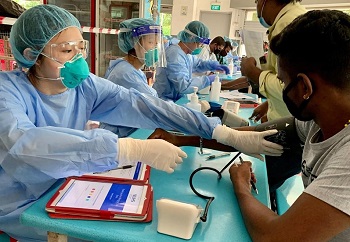
25 April 2021 - Two widely-used therapies - oral hydroxychloroquine and povidone-iodine throat spray – have been found to significantly reduce the risk of COVID-19 infection, according to a study by a team of NUHS clinician-scientists.
Conducted on 3,037 healthy migrant workers quarantined in Tuas South Dormitory last year, the trial randomly assigned participants to receive a six-week preventive course of one of five therapies: oral hydroxychloroquine, povidone-iodine throat spray, oral ivermectin, oral zinc/vitamin C combination, and oral vitamin C.
Vitamin C was used as a comparator medication due to its popularity as a remedy during the pandemic, the scientists said.
The results showed that hydroxychloroquine and the throat spray reduced infection rates by 21 and 24 per cent respectively, when compared against a vitamin C regimen.
In contrast, the zinc/vitamin C combination and ivermectin did not produce any significant risk reduction, the study found. No deaths or pneumonia resulting in hospitalisation occurred.
A/Prof Raymond Seet, the study's lead author, noted that the study is the first large-scale trial to focus solely on the preventive properties of these therapies for patients who have not yet been exposed to the virus, rather than their ability to treat COVID-19.
"These existing drugs could be used to complement existing safety measures in settings where transmission is high while awaiting roll-out of a vaccine," he added.
For instance, individuals can take the therapies when they enter a high-risk setting, such as a cruise ship or nursing home, and stop taking it when they leave.
The team highlighted that the repurposing of existing drugs is an important global strategy against COVID-19 as no medications have been shown to be effective in COVID-19 prevention so far.
This is especially since both hydroxychloroquine and povidone-iodine spray are easily available drugs with well-known safety profiles.
The team also acknowledged the controversy around hydroxychloroquine, which has been the subject of scrutiny ever since it was touted as a 'miracle' cure by then-US President Donald Trump.
"With hydroxychloroquine, at high doses, people were concerned about it because of its cardiac side effects," said Prof Tambyah, one of the study's co-authors and Senior Consultant at National University Hospital - NUH's Department of Infectious Diseases.
"But with the dose we use, which is actually lower than what is being used for arthritis…we've shown that it is safe."
The team noted that additional safety measures were taken in the hydroxychloroquine arm. For instance, participants had to undergo an echocardiogram and were excluded from the trial if they displayed any abnormalities, such as arrhythmia.
Despite the controversy surrounding the drug, A/Prof Seet said that they were not cowed by its bad rap - rather, they were "emboldened".
"Ultimately, our motivation to conduct the study was really to help the migrant workers, who were at the time facing great difficulties in both their mental and physical health," he said.
Although the project initially seemed like "mission impossible", it ultimately succeeded because of the efforts of the many volunteers within NUHS, who stepped up to offer their time and talents to the study.
"This was a ground-up, crowd-sourced project," said A/Prof Seet.
"We set out to do this work, regardless of all the bad publicity and the lack of resources. And I'm very glad we did it."
Related news:
















